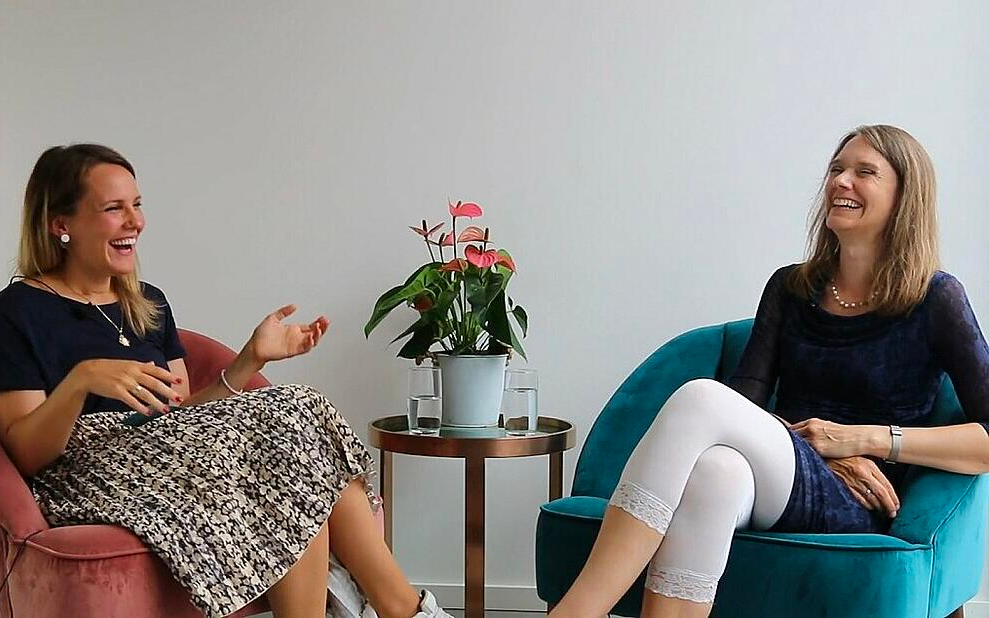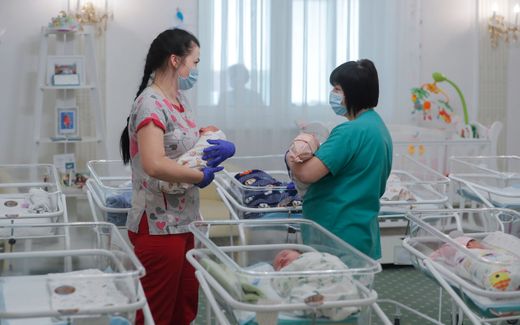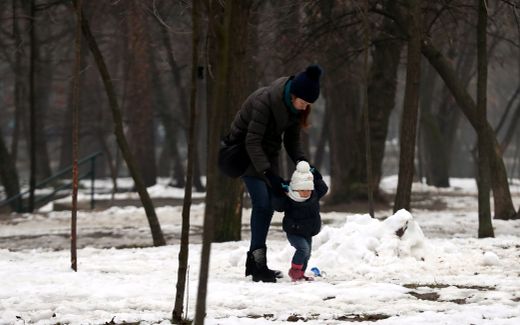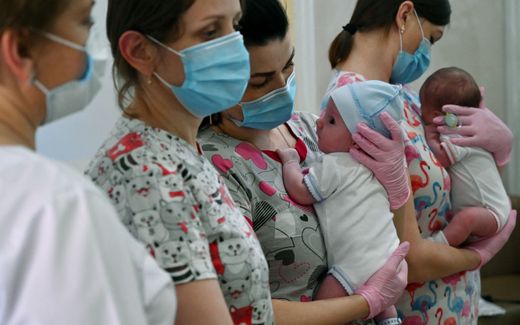MAMA Congress: "We mothers initiate the social turnaround"
18-12-2021
Christian Life
Franziska Harter, Die Tagespost

Two organising mothers of the German MAMA Congress. Christina Walch (left) and Jutta Hartl. Photo DerMamaKongress
Christian Life
Well-educated, carefully dressed, happy to be mothers several times over and proud of this title: the power women at the first Catholic MAMA Congress successfully explode all the negative clichés surrounding the little word "mama".
If the mum is well, the family is well, and society is well". Raising awareness in mothers of the great dignity and importance of their task was the aim of the first Catholic MAMA Congress, early November. There were 2,076 women – an apparent response to the Congress' cause. Strengthening mothers, encouraging them and highlighting their potential was the aim of initiator Christina Walch. The congress wanted to say "thank you to every mother for everything you do, for your family, your children, your marriage, but also this society".
The event's patron was Abbot Maximilian Heim of the Heiligenkreuz monastery, who prayed with the participants via live stream at the beginning. Well-known expert speakers from various scientific fields gave impulse lectures, followed by reports on the experiences of individual mothers. The evenings concluded with sharing groups and common praise.
Recognising one's value as a mother
Somewhere between a retreat, an educational seminar and a boot camp. The congress explored the vocation of women as mothers in all its facets. The picture of motherhood and being a mother was refreshingly undogmatic and diverse.
Manuela Fletschberger, in her keynote speech, "Mama, you are irreplaceable!" summed up motherhood in a simple formula: the ability to dedicate one's life to others and to love unconditionally. Following Mary's example, the woman is "a breaking-in point of God into the world" in a particular way. Every woman carries a great call in her heart to bring God into the world.
As the many testimonies showed, the concrete answer to this looks different for every woman and mother. No rigid model of life was propagated, condemned or pushed in a specific direction. As Gudrun Kugler, Member of the Austrian National Council, working women spoke and mothers who do "event management" at home with their children. Mothers of all ages with a child number varying from 1 to 12 had an equal say.
The entire congress breathed great respect for every single mother and her achievements. "We are all in the same boat," Christina Walch emphasised. The mother of four regularly writes about love, marriage and relationships on her blog. In addition to Walch, the organisers include Manuela Fletschberger and Tatjana Schnegg from the mothers' magazine "Sonne im Haus" (Sun at Home, ed.), as well as the couples Miriam and Wolfgang Herold and Robert and Michaela Schmalzbauer from the Initiative “Christliche Familie” (Christan Family, ed.). For them, the impetus for the congress was the lack of appreciation that mothers receive in society, often through the eyes of outsiders. Manuela Fletschberger is convinced: "We as mothers need to recognise our value." Mothers are the ones who initiate the turnaround in society when they carry the message of the importance of their vocation into their environment with new self-confidence.
Mummy-friendly congress
Deliberately designed to be "mum-friendly", most of the event points were made available as videos, which could be accessed flexibly and at any time during the congress. Sharing groups and worship moments took place via live stream. The five thematic complexes of motherhood (life in marriage, raising children, being a mum in everyday life, and life as a child of God) structured the congress days.
Gudrun Kugler illuminated the importance of the mother from a sociological and political perspective and asked what politics could do to promote families. To create a family-friendly society, the work of mothers and families must be more appreciated, for example, through financial relief.
Professor Hanna-Barbara Gerl-Falkovitz chose a philosophical approach. Being a mother or father is not a role that you can slip into and out of, but a lifelong task. Parental authority (from the Latin augere, to increase) consists in expanding and developing the child's ability to live.
The Viennese psychiatrist and psychotherapist Raphael Bonelli gave a politically incorrect and scientifically impeccable lecture on the complementary differences between men and women; she explained how these differences in body, emotionality and thinking could be lived in an enriching way.
Maria Elisabeth Schmidt gave a lecture on the crucial importance of the parent-child bond for heart formation – a reference to the ability to live qualities such as care, stability and integrity. Heart formation thus offers the best prerequisite for a successful life and successful relationships. It enables the child to develop valuable qualities such as confidence, loyalty, helpfulness, balance and a sense of responsibility. The certified Neufeld course leader and founder of the "Summit of Heart Formation" described in a touching way how parents can achieve to win the tender hearts of their children thanks to successful bonding and to direct them towards good.
Personal testimonies
Numerous testimonies and support for all situations in life lightened up the series of lectures, from living with a child with disabilities, the experience of a miscarriage, money worries in the family to coping with spiritual dry spells and successful communication in marriage.
Stressful moments in being a mother were not left out, such as the worry of not being a good mother and not doing so well compared to other mothers. Magdalena Reuter reported how she first had to grow laboriously into her role as a mother and had to fight the feeling of being overwhelmed for a long time. At the beginning of the first lockdown, a stroke of fate hit her family of five: a breast cancer diagnosis turned family life upside down for months. During the illness, her family was carried by the support and sympathy of those around them. It was this time that taught her to ask for and accept help. The cancer-free mother of three described movingly how she and her family were able to live through this borderline experience with God's help. She was able to experience "that one looks beyond one's weaknesses to heaven and sees that where my limits are, God is there". In this way, she learned not to be afraid of her limits because God is waiting at the boundaries.
Co-organiser Michaela Schmalzbauer emphasised at the end of the congress that through special tasks that life offers, one can also pass on a lot. The broad selection of speakers showed that each mother had something to contribute from her own situation. "What am I personally allowed to live specially and therefore also to pass on?" With this invitation to reflect, the participants were allowed to return to their everyday lives.
"We have hit a nerve"
"The feedback is consistently positive," Christina Walch is pleased to say in an interview with the "Tagespost" after the end of the congress. "We as organisers are incredibly grateful that the congress could take place and that it was so well received. We have hit a nerve; the need is great. Many mothers have written to us saying how important it was for them to hear that they are doing such an important job as a mum."
This article was published previously in the German magazine Die Tagespost.
www.dermamakongress.com
Related Articles





